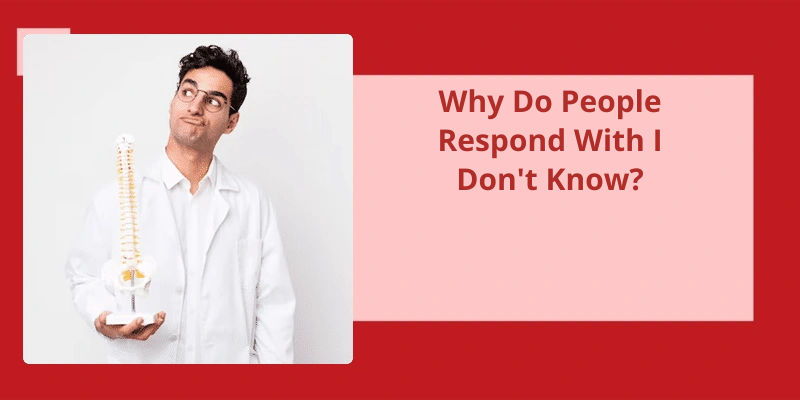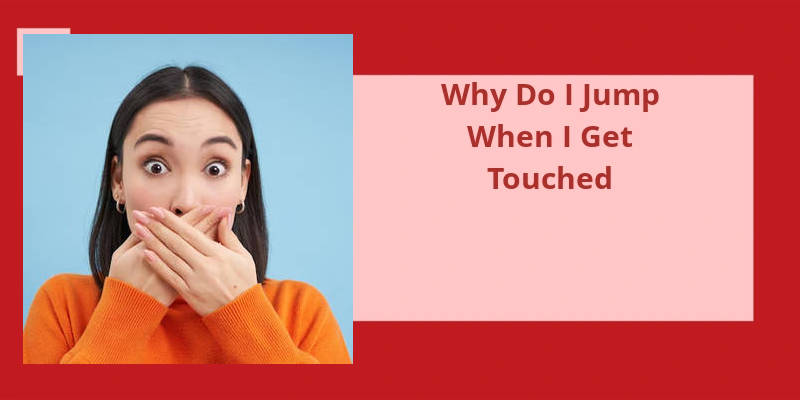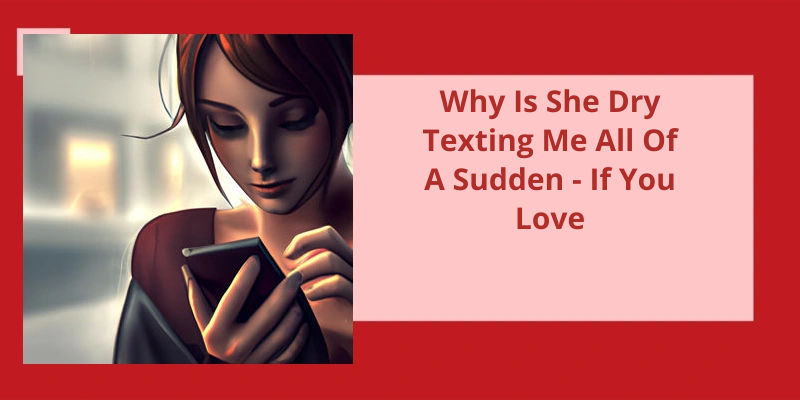Have you ever wondered why people often respond with a seemingly vague and indecisive statement like "I don't know"? It may seem frustrating or puzzling when faced with this response, especially when seeking clarity or advice. However, deep within this seemingly evasive answer lies a complex web of human psychology and self-preservation. The tendency to respond with "I don't know" stems from our innate fear of making the wrong choices and the subsequent judgment or criticism that may follow. We naturally want to avoid the prospect of someone smugly saying, "I told you so," if we end up taking the wrong path. Consequently, it becomes easier to suppress what we truly know or believe, in an attempt to sidestep potential battles with naysayers. This subconscious defensive mechanism protects our ego and shields us from potential disappointment and regret. So, the next time you encounter someone responding with "I don't know," remember that there might be more to it than meets the eye – a delicate balance between fear, protection, and the longing for validation.
Why Do Some People Always Say I Don’t Know?
When faced with a question or a problem, it’s natural for human beings to feel a certain pressure to have all the answers. Society has conditioned us to believe that having knowledge and being able to provide solutions is a sign of intelligence and competence. Therefore, when confronted with a situation where we don’t immediately have an answer, our instinct might be to say, “I don’t know.”
In reality, however, there are countless reasons why someone may respond with “I don’t know.”. Sometimes, it simply means that they need more time to process the information or think through the problem. It could be that they havent had the chance to gather all the necessary facts or consider different perspectives. In these cases, saying “I don’t know” is a way of acknowledging ones own limitations and need for further investigation.
Moreover, some individuals may have a genuine lack of knowledge on a particular topic. The human capacity for learning and understanding is vast, and it’s impossible for everyone to be knowledgeable about everything. When faced with a question or situation outside their field of expertise, people may genuinely not have the necessary knowledge or information to provide a confident answer.
The Importance of Asking Questions and Seeking Clarification When Faced With Something Unfamiliar or Unknown.
- Asking questions and seeking clarification is crucial when encountering unfamiliar or unknown situations.
- By asking questions, you gain a better understanding of the topic or problem at hand.
- Asking questions helps to fill in any gaps in your knowledge or understanding.
- Seeking clarification ensures that you’ve accurate information and helps to avoid misunderstandings.
- By asking questions, you demonstrate your curiosity and willingness to learn.
- Asking questions can lead to new insights and perspectives.
- When faced with something unfamiliar, asking questions can help you overcome challenges and find solutions.
- Seeking clarification shows that you’re proactive and take initiative in understanding complex or unfamiliar concepts.
- Asking questions and seeking clarification fosters effective communication and collaboration.
- By asking questions, you become an active participant in learning and problem-solving processes.
This approach encourages critical thinking and problem-solving skills, allowing individuals to become more self-reliant and confident in finding solutions on their own. It also helps avoid spoon-feeding information and promotes a more interactive and engaging conversation. Answering a question with a question can be an effective communication technique when used appropriately in various contexts.
Why Do People Answer a Question With a Question?
One possible reason for answering a question with a question is simply that the person doesn’t know the answer themselves and doesn’t want to admit it. It’s human nature to want to appear knowledgeable and competent, so rather than risk looking ignorant, some individuals may deflect the question back to the asker. By responding with a question, they can redirect the conversation and avoid exposing their lack of knowledge on the topic.
Another common motivation for answering a question with a question is to encourage critical thinking and problem-solving skills in the person asking. Instead of providing a straightforward answer, the respondent may choose to guide the asker towards finding the solution on their own. This approach can be particularly effective in a learning or therapeutic context, where the goal is to empower individuals to think independently and develop their own problem-solving abilities. By asking thought-provoking questions, a good parent, teacher, or therapist can foster self-discovery and encourage the person to engage in deeper reflection.
Furthermore, responding to a question with a question can also be a way of engaging in a meaningful dialogue. Instead of a one-sided conversation where information is simply handed over, answering with a question can initiate a back-and-forth exchange that promotes active listening and engagement. It invites the asker to explore their thoughts and provides an opportunity for a more interactive and dynamic conversation.
In some cases, answering a question with a question may also be a defense mechanism. By deflecting or redirecting the inquiry, the respondent can avoid revealing personal information or expressing potentially unpopular opinions. This can be particularly relevant in sensitive or controversial discussions where individuals may hesitate to share their views openly. By responding with a question, they can keep the focus off themselves and shift the attention back to the asker.
The act of answering a question with a question can have various motivations. From a desire to hide ones lack of knowledge to fostering critical thinking and active engagement, this response technique serves different purposes in different contexts. Whether it’s an attempt to help the asker think for themselves or a defense mechanism, it’s important to consider the intentions and dynamics at play in any given situation.
Source: Why do people answer only “yes” to a question stating with …
In situations where you find yourself unsure of an answer, it can be beneficial to have alternative responses instead of simply saying, “I don’t know.” By utilizing formal alternatives, you can convey a sense of willingness to assist while maintaining professionalism. Some examples of these alternatives include expressing your willingness to gather information, suggesting someone more knowledgeable, or acknowledging the question’s complexity and the need for further research.
How Do You Respond Instead of I Don’t Know?
When faced with a question to which they don’t have an immediate answer, people often default to the phrase “I don’t know.”. However, there are several alternative ways to respond in such situations. One formal alternative is to say, “Im not certain, but I can find out for you.”. This demonstrates a willingness to help and a commitment to providing accurate information. Another option is to say, “Im not entirely sure, but I believe..”. This suggests that there’s some level of knowledge on the topic, but with a disclaimer that further confirmation may be needed.
In some cases, the person may redirect the question to someone they believe may have the answer. They might say, “Im not the best person to ask, but perhaps [name of colleague/expert] might know.”. By acknowledging their own limitations and suggesting an alternative resource, they’re still showing a willingness to assist the other person. Another possible response is to acknowledge the questions validity by saying, “Thats a good question.”. This conveys respect for the inquiry and a recognition that further exploration may be required.
Lastly, if the person genuinely has no immediate knowledge on the topic, they may respond by saying, “I’d need to do some research before giving an accurate response.”. This demonstrates honesty and a commitment to providing accurate information rather than guessing or giving a potentially incorrect answer. In all of these alternative responses, the intention is to maintain open communication, foster trust, and encourage further collaboration or investigation to arrive at the best possible answer.
Using Empathy: Responding With “I Understand Why You’re Asking, but I Don’t Have the Answer Right Now.” This Shows Empathy Towards the Questioner While Still Acknowledging the Lack of Knowledge.
- Using empathy: Responding with “I understand why you’re asking, but I don’t have the answer right now.” This shows empathy towards the questioner while still acknowledging the lack of knowledge.
This behavior of answering Amazon questions with “I don’t know” can be attributed to the email notification system employed by the platform. As the questions are sent directly to individuals who’ve purchased the item, recipients may feel a sense of obligation to respond, even if they’re uncertain or lack the necessary knowledge. However, simply ignoring the email might be a more efficient approach to prevent misleading responses.
Why Do People Answer Amazon Questions With I Don’t Know?
When it comes to answering Amazon questions with “I don’t know,” there are a few factors at play. Firstly, the way Amazon operates it’s question and answer system is by sending emails to individuals who’ve purchased the specific item. This can create confusion for some recipients, as they may interpret the email as a direct inquiry and feel obligated to respond.
Moreover, the email format itself can contribute to this confusion. Emails are often perceived as personal messages, and individuals may feel compelled to acknowledge and reply to them, even if they don’t have the requested information. This sense of obligation, combined with a lack of knowledge, leads some people to simply reply with “I don’t know” instead of ignoring the email altogether.
Additionally, people may respond with “I don’t know” due to a desire to be helpful, albeit in a limited capacity. They might believe that even though they don’t possess the necessary knowledge, acknowledging the question and responding with an honest “I don’t know” is better than completely ignoring it. This stems from a sense of social responsibility and a desire to assist others, even if it means admitting their own lack of expertise.
Furthermore, some individuals may feel a certain level of guilt or fear of judgment if they don’t respond. They might worry that by not answering, they’re neglecting their role as a responsible consumer or community member, leading them to provide a response even if it lacks substance. The fear of being perceived as unhelpful or uncaring can be a motivating factor in these situations.
Conclusion
Overall, the tendency for people to respond with "I don't know" when faced with difficult questions or decision-making situations may not simply be a result of genuine uncertainty or lack of knowledge. Instead, it could be a defense mechanism aimed at avoiding potential criticism or judgment from others. By feigning ignorance or suppressing what they actually know, individuals can shield themselves from the potential criticism of being wrong or making mistakes. This hesitation to assert oneself also stems from the fear of external judgment and the desire to avoid those who might eagerly say "I told you so" if their choices prove to be less than successful. Thus, the inclination to respond with "I don't know" may reflect a deeper need for self-preservation in the face of potential naysayers.






